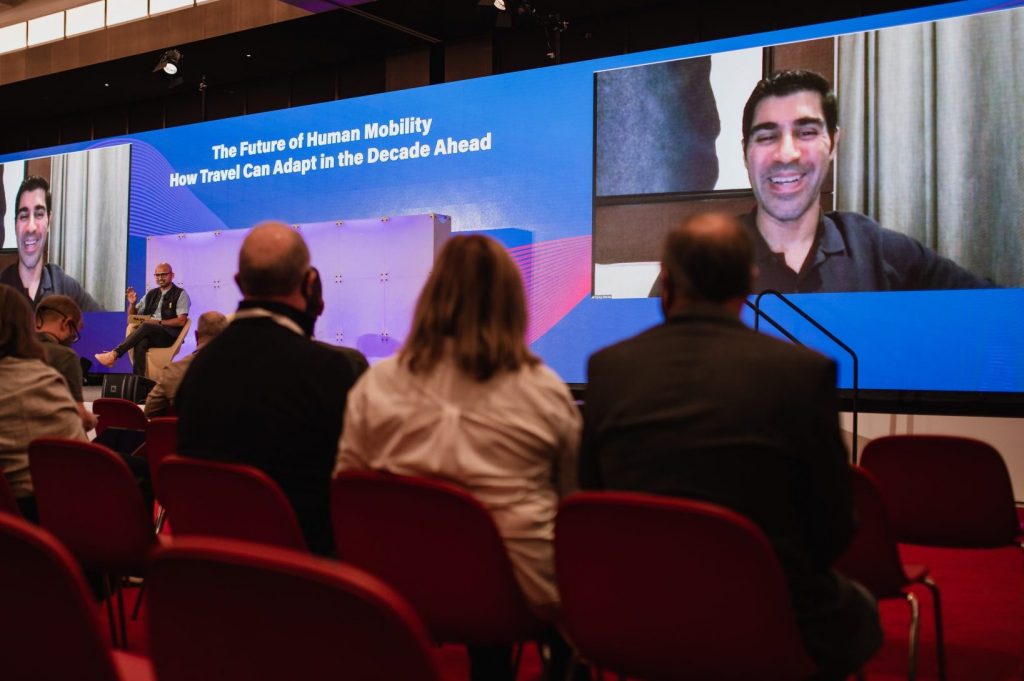Skift Take
The media may be spinning a tale of increased nationalism, but that's not what's actually happening. The travel industry's focus must stay on the world's shifting human mobility patterns where it can play a huge role and reap the benefits.
Multiple forces, from economic to remote work, climate and migration, are hitting the world at once and affecting as well as shifting human mobility patterns, causing people to change their locations or become mobile — it’s the “great migration” ahead and that’s exactly where the travel industry can play a huge role by anticipating and preparing for those changes.
That’s the crux of the message author and geopolitical scientist Parag Khanna shared on the opening night of Skift Global Forum in New York City on Tuesday, in a one-on-one discussion with Skift co-founder and CEO Rafat Ali on “how travel can adapt in the decade ahead.”
“We want to get ahead of those trends and enable that movement,” Khanna told Ali, noting that what lies ahead is the “great migration.”
The remote worker visa shift alone is indicative of the opportunities ahead for destinations. While under five countries were offering remote work visas pre pandemic, that number is now closer to about 75 countries, Khanna said.
“So there is this enabling to prepare for the next great migration, in winning people over in the war for talent — that should inform some of the industry’s decisions,” Khanna said.
Thanks to the rapid digitization, the number of people who’ve become location independent is reaching 40 percent of the global workforce, Khanna said, noting that this translates into three billion people who could potentially change location domestically or internationally. “Those are the ones that I call the cloud people.”
But it’s not just the remote visa demands that are on the rise and indicate a boom in mobility. Climate change will shift patterns too, as young people seek ideal places to live, along with other factors such as affordable housing.
Migrants are also highly sought out by countries for work, even more so than in the past.
“It’s a pity that our headlines are dominated by notions of xenophobia and protectionism because the fact is — look at Canada opening up to mass migration, and Germany said they need 400,000 migrants a year in their labor force,” Khanna said, adding that the Biden administration is also expanding the H1B visa quota, including allowing spouses of those visa holders to work, and that the U.S. became more diverse in every possible way even under the Trump administration.
“The UK, which had Brexit on the basis of wanting to control borders and immigaiton is easier to migrate to today in 2021 than it was in 2015,” Khanna said, adding that ultimately, countries need young people to move in, to be taxpayers, the caregivers and the entrepreneurs of the future, Khanna said.
On Skift’s Ali’s question about promising signals for the travel industry from the last 18 months, Khanna’s analysis, which he covers in his latest book Move, is that the changes were already happening before the pandemic hit — including “the digitization of everything” which is in turn, allowing for greater mobility.
“This is what is happening now — the demateralizing of everything and that’s going to enable mobility but it’s up to us to build all of this to unlock that future.”
People moving away from overpriced cities and the growing popularity of RVs isn’t something that started before Covid, which Khanna called “mobile real estate.”
“That’s what it’s becoming, an asset class. I expect that to continue because young people aren’t sure where they’re going to be working… I don’t view that as retreat or surrender, I see that as adaptation”
This future promise of young people going mobile and using their sixth sense to not invest and live in debt but rather to remain mobile is a great tailwind fo the travel industry, Khanna stressed, adding that now people can move multiple times within the same year which is a good thing for the economy and is important for the travel industry.
In response to Ali’s question of giving advice to their children, Khanna, who has visited over 100 countries, was unequivocal.
“I talk to students all the time and I always say — be mobile. Seek experiences across borders. Be adaptable in that way it’s absolutely crucial because we are entering a world that is so complex.”
The Daily Newsletter
Our daily coverage of the global travel industry. Written by editors and analysts from across Skift’s brands.
Have a confidential tip for Skift? Get in touch
Tags: coronavirus, coronavirus recovery, sgf2021, skift live
Photo credit: Skift Global Forum 2021 kicks off with Parag Khanna on the future of human mobility. Matt Matieiscu / Skift
